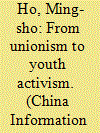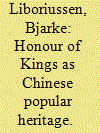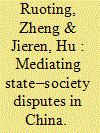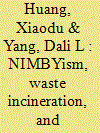| Srl | Item |
| 1 |
ID:
175163


|
|
|
|
|
| Summary/Abstract |
This article examines two major protests related to working-hour reforms in Taiwan in 2000 and 2016–18, paying particular attention to the shift in the composition of protesters from union members to youth activists. The decline in mass membership and the failure to consolidate a national federation have diminished the political presence of labour unions. The emergence of youth protest movements, both before and after the 2014 Sunflower Movement, made possible the advent of Taiwan’s youth as political actors. The reconfiguration of Taiwan’s working hour politics has paralleled the global transition from the classical organization-based collective action to the digitally enabled ‘connective action’. The concluding section provides reflections on the impacts as well as the limitations of this newer form of labour politics.
|
|
|
|
|
|
|
|
|
|
|
|
|
|
|
|
| 2 |
ID:
175159


|
|
|
|
|
| Summary/Abstract |
This article examines how users on social media responded to state criticism of the representation of Chinese historical characters in the popular Tencent mobile game Honour of Kings. The game’s usage of historical characters and the ensuing debate and criticism are analysed as ‘popular heritage’. A qualitative content analysis identifies several categories in the discussion of this game on the Q & A website Zhihu (知乎). The article discusses these categories in relation to existing literature on popular heritage. The analysis contributes to this literature by identifying a new feature of popular heritage, whereby the dissonance associated with popular heritage becomes in itself an enjoyable object of popular pleasure, deepening popular heritage’s capacity to generate critique of authorized heritage and exposing divisions within the power bloc. In light of these findings, we call for an approach to popular heritage that escapes a dichotomous people–elite schema in favour of a multi-actor approach.
|
|
|
|
|
|
|
|
|
|
|
|
|
|
|
|
| 3 |
ID:
175162


|
|
|
|
|
| Summary/Abstract |
Where popular contention in China is concerned, third parties are not merely supporters of protesters but also allies of the state. Through quantitative and qualitative methods, this article uses an actor-centred perspective to explore the dual role of Chinese lawyers in state dispute resolution projects. When providing legal counselling services to the public, lawyers adopt selective strategies and channel non-political cases into legal channels while keeping political cases within the political arena. When handling social disputes for the government, however, they apply professional diagnoses and legal persuasion, and intervene through mediation and negotiation. Three factors constrain the effectiveness of Chinese lawyers during dispute resolution. These are the limited access to cases, the dilemmas inherent in acting simultaneously both as a third party and as a state agent, and the restricted influence of lawyers over the final resolution of social disputes. This article argues that the selective responses of Chinese lawyers during legal counselling and strategic defence of state power in dispute resolution make them a governance tool for stability maintenance. Their participation contributes more to legal repression than to legal development in contemporary China.
|
|
|
|
|
|
|
|
|
|
|
|
|
|
|
|
| 4 |
ID:
175160


|
|
|
|
|
| Summary/Abstract |
With the world’s largest population and rapid urbanization, China is in the throes of a waste management crisis. Efforts to cope with this crisis through waste incineration have been met with growing NIMBYism as the Chinese public become more environmentally aware and are determined to protect their health and economic interests. We review the turn to incineration and the major characteristics of NIMBYism and ensuing protests against waste incinerators. We then describe the May 2014 Jiufeng incinerator protest in Hangzhou and the subsequent efforts to successfully respond to NIMBYist protests and build the proposed incineration plant on the planned site. The Hangzhou Jiufeng case offers a model for breaking the logjam between development and NIMBYism, leading to important improvements in environmental governance and regulation.
|
|
|
|
|
|
|
|
|
|
|
|
|
|
|
|
| 5 |
ID:
175161


|
|
|
|
|
| Summary/Abstract |
Due to unsolved maritime delimitations, the protection of underwater cultural heritage (hereafter underwater heritage) in the South China Sea demands coordinated action by neighbouring states. However, the suspicion that China uses underwater heritage to justify its interests has tempered the general enthusiasm of its neighbours to cooperate in the issue of heritage protection. In the face of such concerns, this article examines the role of underwater heritage in China’s South China Sea claims, and it argues that underwater heritage provides little support to underpin China’s territorial or maritime claims. In addition, China’s initiatives in maritime archaeology have long been misinterpreted. Instead of being entirely driven by its South China Sea claims, China’s approach to underwater heritage is a natural result of its general policy on cultural heritage and nation-building philosophy.
|
|
|
|
|
|
|
|
|
|
|
|
|
|
|
|